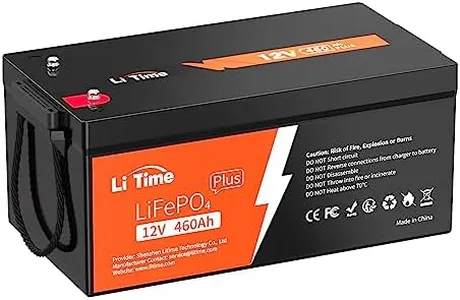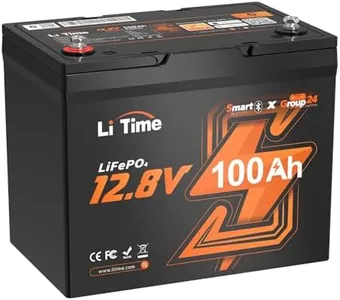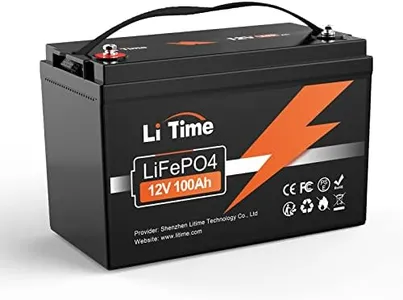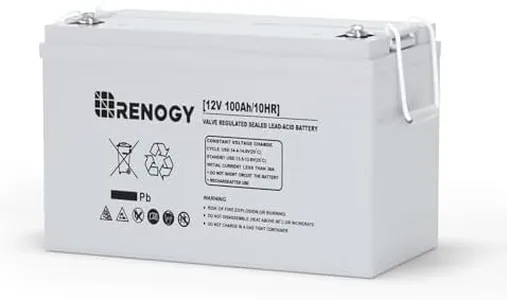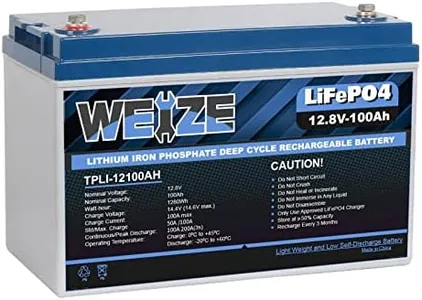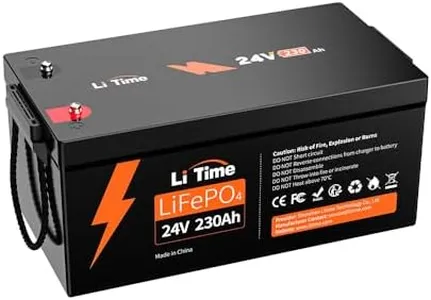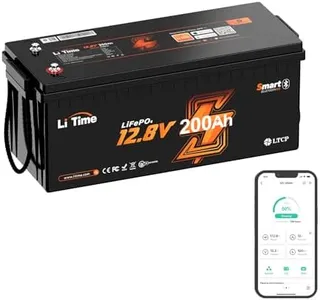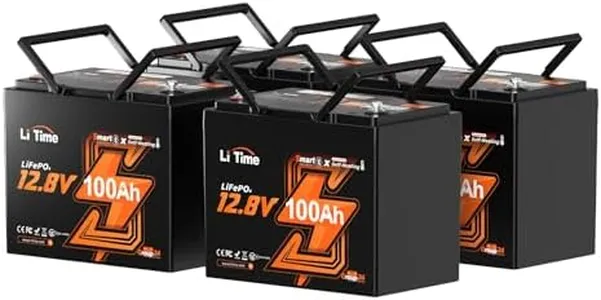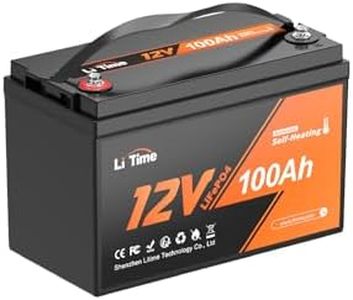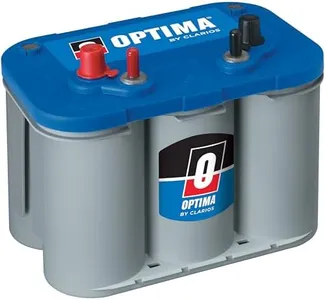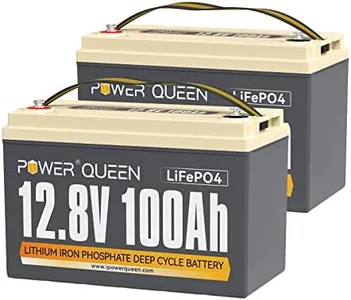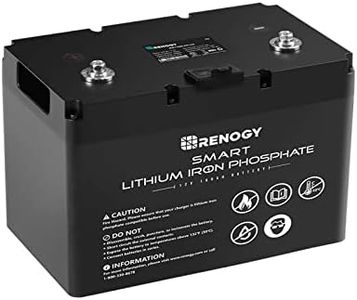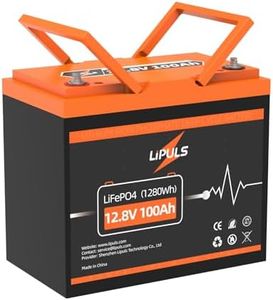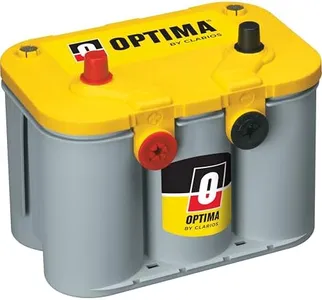10 Best RV Batteries 2025 in the United States
Our technology thoroughly searches through the online shopping world, reviewing hundreds of sites. We then process and analyze this information, updating in real-time to bring you the latest top-rated products. This way, you always get the best and most current options available.

Our Top Picks
Winner
LiTime 12V 100Ah Group 24 Bluetooth LiFePO4 Battery, Deep Cycle Lithium Battery, Built-in 100A BMS with Low-Temp Protection, Max. 15000 Cycles, Perfect for RV, Solar System, Trolling Motors etc.
Most important from
1698 reviews
The LiTime 12V 100Ah Group 24 Bluetooth LiFePO4 Battery stands out in the RV battery category due to its lithium iron phosphate (LiFePO4) technology. It features a high capacity of 100Ah, offering robust energy storage for RVs, solar systems, and trolling motors. One of its major strengths is its lightweight design at just 21.9 pounds, making it significantly easier to handle compared to traditional lead-acid batteries, which are heavier and bulkier.
Additionally, its compact size (6.61 x 10.24 x 8.3 inches) ensures it fits well in various installation spaces, adhering to the BCI Group 24 size standard for universal compatibility in different vehicles and applications. Another notable feature is the built-in Bluetooth monitoring system, allowing users to track battery performance in real-time through the LiTime app. This feature is particularly useful for RV owners who need to manage their power usage efficiently.
The battery also includes a smart BMS (Battery Management System) that offers protection against over-charging, over-discharging, over-current, short-circuit, and low-temperature conditions, enhancing safety and longevity. The cycle life of up to 15,000 cycles is impressive and ensures long-term reliability. However, it is important to note that the battery requires an initial activation using a lithium-activation charger or MPPT charger to enable the Bluetooth function, which might be an extra step for some users. Additionally, it is not suitable for starting engines, golf carts, or jacks, which limits its versatility.
Despite these minor drawbacks, the LiTime 12V 100Ah Group 24 Bluetooth LiFePO4 Battery is a strong contender for RV owners looking for a high-performance, low-maintenance, and durable power solution. With a 5-year warranty and robust customer support, it offers peace of mind and reliable service.
Most important from
1698 reviews
LiTime 12V 100Ah LiFePO4 Battery BCI Group 31 Lithium Battery Built-in 100A BMS, Up to 15000 Deep Cycles, Perfect for RV, Marine, Home Energy Storage
Most important from
1903 reviews
The LiTime 12V 100Ah LiFePO4 Battery is a high-quality lithium battery that excels in many aspects crucial for RV and energy storage applications. It's constructed with Grade A+ Lithium Iron Phosphate cells, offering high energy density and stable performance. One of its standout features is its impressive cycle life, boasting up to 15,000 deep cycles, significantly higher than traditional lead-acid batteries, making it a long-lasting option.
Additionally, it has a lightweight design at just 24.25 lbs, which is about one-third the weight of comparable lead-acid batteries, making it easier to handle and install. The battery maintains a high efficiency of around 95%, allowing for better run-time and more effective use of its capacity. When it comes to safety, it meets several standards (UL, FCC, UN38.3), ensuring reliability. The built-in 100A battery management system (BMS) further safeguards against common issues like overcharging and overheating.
It's worth noting that this battery is designed for energy storage purposes and is not suitable for starting engines. While it provides excellent performance for RVs, marine use, and home energy storage, those needing a battery for starting applications should look elsewhere. The product comes with a 5-year warranty and customer support that promises timely responses, which adds peace of mind for users.
Most important from
1903 reviews
GrenerPower 12.8V 100Ah LiFePO4 Battery, Built-in 100A BMS, Max.1280Wh Lithium Iron Phosphate Battery with Up to 15000 Cycles & 10 Years Lifespan for RV, Camper, Solar Energy, Off Grid, Trolling Motor
Most important from
122 reviews
The GrenerPower 12.8V 100Ah LiFePO4 battery is a high-capacity lithium iron phosphate battery that's well-suited for RVs, campers, and other off-grid applications. It features a built-in 100A Battery Management System (BMS) for safety and longevity, offering up to 15,000 cycles at 60% Depth of Discharge (DOD), which translates to a potentially long lifespan of up to 10 years. This is a significant advantage over traditional lead-acid batteries, which typically have a much shorter cycle life and higher maintenance needs.
The battery’s capacity of 100Ah and max energy of 1280Wh ensure it can power a variety of devices, making it versatile for different uses like solar energy storage and trolling motors. Additionally, it adheres to Group 24 size standards, making it easy to replace existing lead-acid batteries without needing major adjustments. Weighing only 22.57 pounds, it’s also considerably lighter than its lead-acid counterparts, which simplifies installation and transport.
However, it is important to note that this battery is not suitable for use as a starting battery for cars or golf carts. Its compact size of 6.61 x 10.23 x 8.3 inches makes it relatively easy to fit into tight spaces. With a 5-year support guarantee, the GrenerPower battery provides peace of mind for long-term use. If your current charging system is designed for lead-acid batteries, you may need technical support to ensure compatibility.
Most important from
122 reviews
Buying Guide for the Best RV Batteries
Choosing the right RV battery is crucial for ensuring that your recreational vehicle has a reliable power source for all your adventures. The right battery will provide the necessary power for your appliances, lights, and other electrical needs while you're on the road or camping off-grid. To make an informed decision, it's important to understand the key specifications and how they relate to your specific needs and usage patterns.FAQ
Most Popular Categories Right Now
